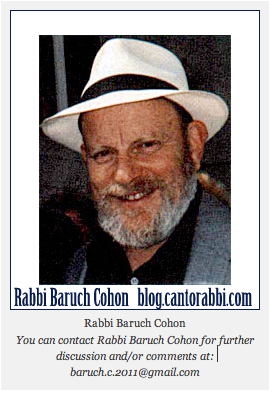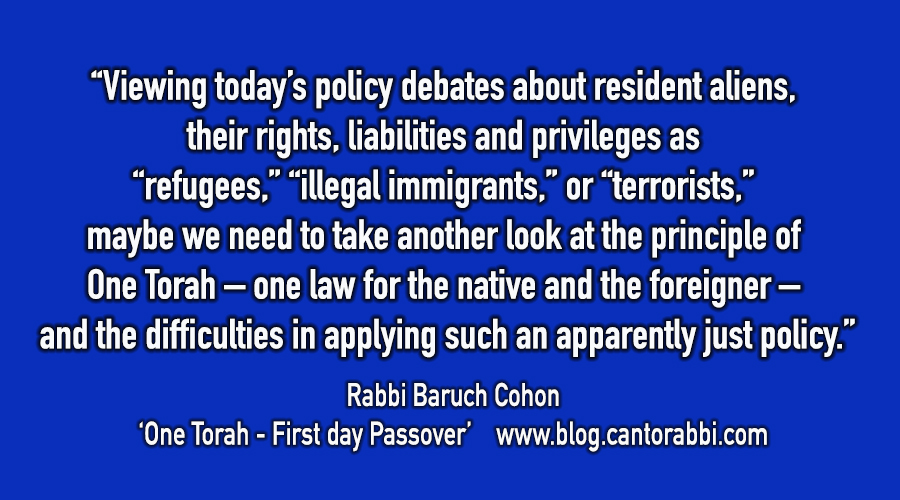
ONE TORAH – First day Passover – by Rabbi Baruch Cohon
This year our great holiday of freedom begins on Shabbos, so we will read the special portion for the First Day of Passover, from the Book of Exodus chapter 12, describing the fateful night of the original Exodus. From the preparation of the sacrificial lamb to marking the doorposts of the Hebrews’ homes, the narrative continues with the Tenth Plague – death of the firstborn, which struck the Egyptians but spared the Hebrew slaves. The avenging angel saw the blood on the doorposts and passed over – pasach. So here comes the commandment that the people must keep this festival in celebration of this great deliverance, even when they reach their homeland. Here we also read how the Egyptians, struck and bereaved and desperate, pushed the slaves to go – go free, get on your way! They even gave the Israelites valuable gifts, including gold and silver, to urge them out. Many Egyptians followed them, forming an eyrev rav – a mixed multitude. After 430 years in the country called bet avadim (“the home of slaves”}, the people of Israel get their instructions for their free future:
It was a night of watching for G-d, bringing them out of the Land of Egypt; that is tonight, a night of watching for all generations. This is the law of the paschal sacrifice: no alien may eat any of it. … But if a proselyte lives with you and will offer a Passover sacrifice, let him and all the males in his household be circumcised; then they can eat. One Torah shall be for the native and the proselyte who lives among you (resident alien).
One Torah, one law. No penalties for aliens, and no special privileges for them either. Without doubt, circumcision represents sincere commitment. One holiday meal would hardly seem enough of an attraction to take that step. Very few men were likely to do that. So we must recognize that some really valuable converts entered our fold, to be required to follow the same mitzvos as born Jews.
Elsewhere we learn about resident aliens, called literally ger toshav. They lived among the Israelites in the Land of Israel and were not expected to keep the 613 commandments required of Jews. All they needed to observe were the 7 mitzvos b’ney Noakh – the commandments of the sons of Noah, given after the Flood: (1) establish courts of justice, (2) prohibit blasphemy, (3) prohibit idolatry, (4) prohibit incest, (5) prohibit bloodshed, (6) prohibit robbery, (7) do not eat flesh cut from a living animal. Not a word about observing the Sabbath, or keeping kosher, or celebrating any particular occasions. Not even about whom – or how many – to marry. Just everyday morality. Did the ger toshav just possiblyhave it easier than his Jewish neighbors?
Viewing today’s policy debates about resident aliens, their rights, liabilities and privileges as “refugees,” “illegal immigrants,” or “terrorists,” maybe we need to take another look at the principle of One Torah – one law for the native and the foreigner – and the difficulties in applying such an apparently just policy. Certainly, world conditions changed many times since this principle was stated. Not even Noah’s 7 commandments are all observed everywhere. Blasphemy? Idolatry? Incest? What punishments do they provoke?
Historical problems frequently become modern problems in places like the Middle East, as recent events illustrate. When two countries have a war, and territory changes hands, the people who live in that territory have a choice: accept the new government or move out. That generally applies everywhere in the world. But not in Israel. Witness the bitter controversy raging over the West Bank and Golan. From a historical perspective, the One State Solution already exists for Israeli Arabs and Druze who hold citizenship and serve in the IDF and the Knesset. One Torah for them. But others still pursue a fictitious nationality promoted by Arafat. It was former Israeli Prime Minister Golda Meir aleha hashalomwho put it straight when she said “There are no Palestinians.” For those who insist on calling themselves by that name, exit will work, and they violently resist that.
Ancient Israel, modern Israel, the United States or any other country, can face problems that come with a mixed population. In Torah times, most states assumed unanimity, and ruled their people accordingly, whether it suited facts or not. In those days, Israel already recognized differences in its inhabitants, and governed all with One Torah. In our high-tech, multi-ethnic world, we should do no less.


